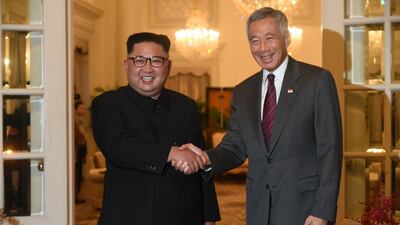It says much about the two mercurial leaders meeting on Tuesday in Singapore that they could either bring tensions in the Korean peninsula to boiling point – or bring it a step closer to full denuclearisation. The summit between US President Donald Trump and North Korean leader Kim Jong-un comes less than a year after the two traded vicious barbs amid repeated missile testing by North Korea, sparking real fears of war.
But cautious optimism is the best approach to a spectacle that raises more questions than it answers. Will North Korea, having spent decades developing a nuclear deterrent, entertain the key US demand to denuclearise? What concessions will Mr Trump make? And will they declare an official end to the Korean war? Neighbouring powers will be watching nervously; while South Korea and Japan seek peace and denuclearisation, China seemingly fears a united Korean peninsula with a US presence on its border.
To quote US Vice President Mike Pence: "As the president often says, we'll see what happens." But the fact remains that, all reservations aside, Mr Trump is the first US leader to meet his North Korean counterpart. The significance of that gesture alone for the peninsula and the globe is hard to overstate.
In the run-up, there were significant doubts about whether the summit would happen at all; with it confirmed, there is real potential for peace. Mr Trump needs a win following the G7 summit, where he clashed with allies over Iran, climate change and trade tariffs.
Deeply unconventional in his diplomacy, many credit his approach for bringing Pyongyang to the table. North Korea has made overtures in recent months, from destroying weapons test sites to freeing American prisoners, while Mr Kim has declared his intention to focus more on economic, rather than military, growth. It bodes well for Tuesday's summit, although as ever, his behaviour warrants scepticism.
Since Pyongyang accrues legitimacy from its nuclear threat, many question its incentive to denuclearise. Meanwhile, some suggest Mr Trump has already yielded too much to the North Koreans, who have been trying to meet a US president for years.
As such, Mr Trump is taking a big risk on the wily leader of an adversary. If he can secure genuine concessions, he will deserve all the praise that will come his way.
One issue that might not make the agenda is the plight of the North Korean people, victimised by a regime that cares little for human rights. One of the peninsula’s most tragic realities today is the height gap between North and South Korean pre-school children: approximately four centimetres. The severity of that stunting since 1945 is indicative of chronic malnutrition.
So when viewers tune in on Tuesday, they should hope that the moment not be wasted and pause to think of the North Korean people. The possibility of peace is in the hands of two mavericks who might surprise us yet.

